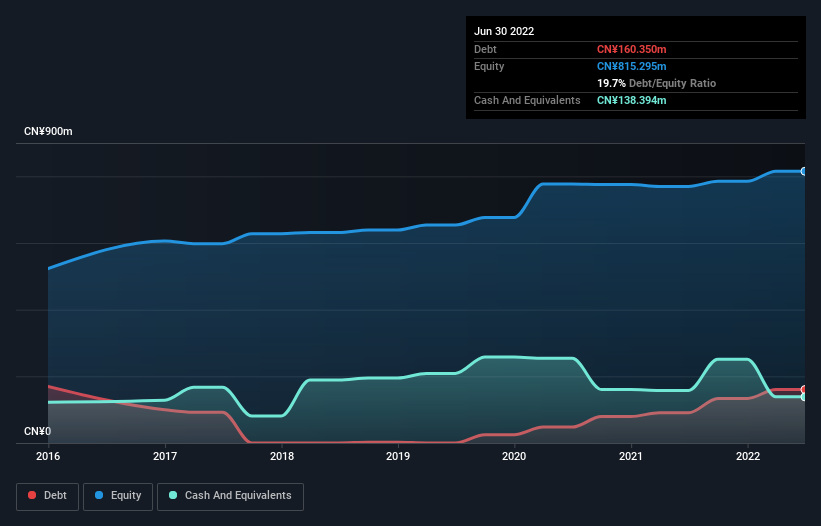- Hong Kong
- /
- Real Estate
- /
- SEHK:865
These 4 Measures Indicate That Jiande International Holdings (HKG:865) Is Using Debt Extensively
Howard Marks put it nicely when he said that, rather than worrying about share price volatility, 'The possibility of permanent loss is the risk I worry about... and every practical investor I know worries about.' It's only natural to consider a company's balance sheet when you examine how risky it is, since debt is often involved when a business collapses. We note that Jiande International Holdings Limited (HKG:865) does have debt on its balance sheet. But the real question is whether this debt is making the company risky.
When Is Debt A Problem?
Debt and other liabilities become risky for a business when it cannot easily fulfill those obligations, either with free cash flow or by raising capital at an attractive price. In the worst case scenario, a company can go bankrupt if it cannot pay its creditors. However, a more common (but still painful) scenario is that it has to raise new equity capital at a low price, thus permanently diluting shareholders. Of course, plenty of companies use debt to fund growth, without any negative consequences. When we examine debt levels, we first consider both cash and debt levels, together.
Check out the opportunities and risks within the HK Real Estate industry.
How Much Debt Does Jiande International Holdings Carry?
As you can see below, at the end of June 2022, Jiande International Holdings had CN¥160.4m of debt, up from CN¥90.7m a year ago. Click the image for more detail. However, because it has a cash reserve of CN¥138.4m, its net debt is less, at about CN¥22.0m.

How Strong Is Jiande International Holdings' Balance Sheet?
According to the last reported balance sheet, Jiande International Holdings had liabilities of CN¥434.8m due within 12 months, and liabilities of CN¥82.9m due beyond 12 months. On the other hand, it had cash of CN¥138.4m and CN¥12.5m worth of receivables due within a year. So its liabilities total CN¥366.8m more than the combination of its cash and short-term receivables.
This deficit is considerable relative to its market capitalization of CN¥436.3m, so it does suggest shareholders should keep an eye on Jiande International Holdings' use of debt. This suggests shareholders would be heavily diluted if the company needed to shore up its balance sheet in a hurry.
We use two main ratios to inform us about debt levels relative to earnings. The first is net debt divided by earnings before interest, tax, depreciation, and amortization (EBITDA), while the second is how many times its earnings before interest and tax (EBIT) covers its interest expense (or its interest cover, for short). Thus we consider debt relative to earnings both with and without depreciation and amortization expenses.
Jiande International Holdings has net debt of just 0.34 times EBITDA, suggesting it could ramp leverage without breaking a sweat. And remarkably, despite having net debt, it actually received more in interest over the last twelve months than it had to pay. So it's fair to say it can handle debt like a hotshot teppanyaki chef handles cooking. Although Jiande International Holdings made a loss at the EBIT level, last year, it was also good to see that it generated CN¥64m in EBIT over the last twelve months. There's no doubt that we learn most about debt from the balance sheet. But it is Jiande International Holdings's earnings that will influence how the balance sheet holds up in the future. So if you're keen to discover more about its earnings, it might be worth checking out this graph of its long term earnings trend.
Finally, a company can only pay off debt with cold hard cash, not accounting profits. So it is important to check how much of its earnings before interest and tax (EBIT) converts to actual free cash flow. Over the last year, Jiande International Holdings saw substantial negative free cash flow, in total. While investors are no doubt expecting a reversal of that situation in due course, it clearly does mean its use of debt is more risky.
Our View
While Jiande International Holdings's conversion of EBIT to free cash flow has us nervous. To wit both its interest cover and net debt to EBITDA were encouraging signs. Taking the abovementioned factors together we do think Jiande International Holdings's debt poses some risks to the business. While that debt can boost returns, we think the company has enough leverage now. There's no doubt that we learn most about debt from the balance sheet. But ultimately, every company can contain risks that exist outside of the balance sheet. We've identified 2 warning signs with Jiande International Holdings (at least 1 which is a bit unpleasant) , and understanding them should be part of your investment process.
When all is said and done, sometimes its easier to focus on companies that don't even need debt. Readers can access a list of growth stocks with zero net debt 100% free, right now.
New: Manage All Your Stock Portfolios in One Place
We've created the ultimate portfolio companion for stock investors, and it's free.
• Connect an unlimited number of Portfolios and see your total in one currency
• Be alerted to new Warning Signs or Risks via email or mobile
• Track the Fair Value of your stocks
Have feedback on this article? Concerned about the content? Get in touch with us directly. Alternatively, email editorial-team (at) simplywallst.com.
This article by Simply Wall St is general in nature. We provide commentary based on historical data and analyst forecasts only using an unbiased methodology and our articles are not intended to be financial advice. It does not constitute a recommendation to buy or sell any stock, and does not take account of your objectives, or your financial situation. We aim to bring you long-term focused analysis driven by fundamental data. Note that our analysis may not factor in the latest price-sensitive company announcements or qualitative material. Simply Wall St has no position in any stocks mentioned.
About SEHK:865
Jiande International Holdings
An investment holding company, engages in the development and sale of real estate properties in the People’s Republic of China.
Excellent balance sheet with very low risk.
Market Insights
Community Narratives


Recently Updated Narratives


The Quiet Giant That Became AI’s Power Grid


Nova Ljubljanska Banka d.d will expect a 11.2% revenue boost driving future growth


The AI Infrastructure Giant Grows Into Its Valuation
Popular Narratives


The company that turned a verb into a global necessity and basically runs the modern internet, digital ads, smartphones, maps, and AI.


MicroVision will explode future revenue by 380.37% with a vision towards success



